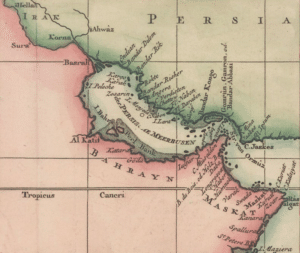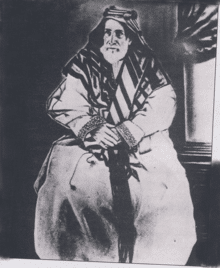
In 1783, Al-Madhkur lost the islands of Bahrain following his defeat by the Bani Utbah tribe at the 1782 Battle of Zubarah. Bahrain was not new territory to the Bani Utbah; they had been a presence there since the 17th century.
The Al Bin Ali were the dominant group controlling the town of Zubarah on the Qatar peninsula, originally the center of power of the Bani Utbah. After the Bani Utbah gained control of Bahrain, the Al Bin Ali had a practically independent status there as a self-governing tribe. Later, different Arab family clans and tribes from Qatar moved to Bahrain to settle after the fall of Nasr Al-Madhkur of Bushehr. These families included the House of Khalifa, Al-Ma’awdah, Al-Fadhil, Al-Mannai, Al-Noaimi, Al-Sulaiti, Al-Sadah, Al-Thawadi and other families and tribes.
The House of Khalifa moved from Qatar to Bahrain in 1799. Originally, their ancestors were expelled from Umm Qasr in central Arabia by the Ottomans due to their predatory habits of preying on caravans in Basra and trading ships in Shatt al-Arab waterway until Turks expelled them to Kuwait in 1716, where they remained until 1766.
19th Century and Later:
In the early 19th century, Bahrain was invaded by both the Omanis and the Al Sauds. In 1816, the British political resident in the Gulf, William Bruce, received a letter from the Sheikh of Bahrain who was concerned about a rumour that Britain would support an attack on the island by the Imam of Muscat. He sailed to Bahrain to reassure the Sheikh that this was not the case and drew up an informal agreement assuring the Sheikh that Britain would remain a neutral party.
In 1820, the Al Khalifa tribe were recognised by Great Britain as the rulers (“Al-Hakim” in Arabic) of Bahrain after signing a treaty relationship. However, ten years later they were forced to pay yearly tributes to Egypt despite seeking Persian and British protection.

In 1860, the Al Khalifas used the same tactic when the British tried to overpower Bahrain. Writing letters to the Persians and Ottomans, Al Khalifas agreed to place Bahrain under the latter’s protection in March due to offering better conditions. Eventually the Government of British India overpowered Bahrain when the Persians refused to protect it. Colonel Pelly signed a new treaty with Al Khalifas placing Bahrain under British rule and protection.
Following the Qatari–Bahraini War in 1868, British representatives signed another agreement with the Al Khalifas. It specified that the ruler could not dispose of any of his territory except to the United Kingdom and could not enter into relationships with any foreign government without British consent. In return the British promised to protect Bahrain from all aggression by sea and to lend support in case of land attack. More importantly the British promised to support the rule of the Al Khalifa in Bahrain, securing its unstable position as rulers of the country. Other agreements in 1880 and 1892 sealed the protectorate status of Bahrain to the British.
